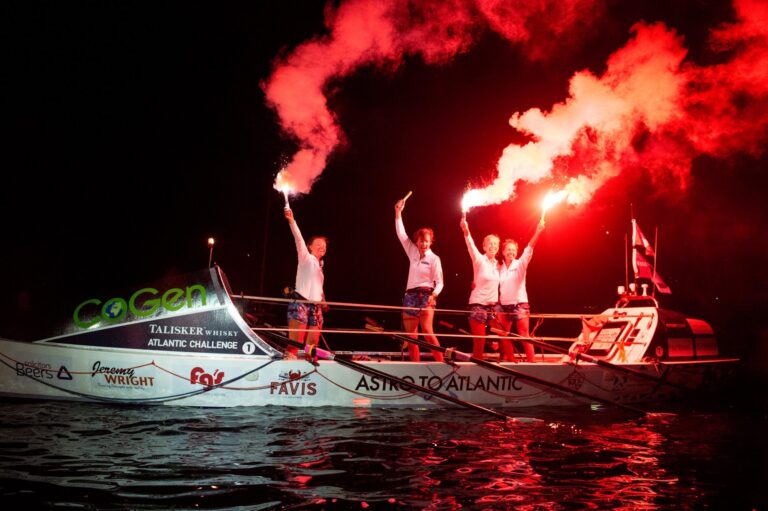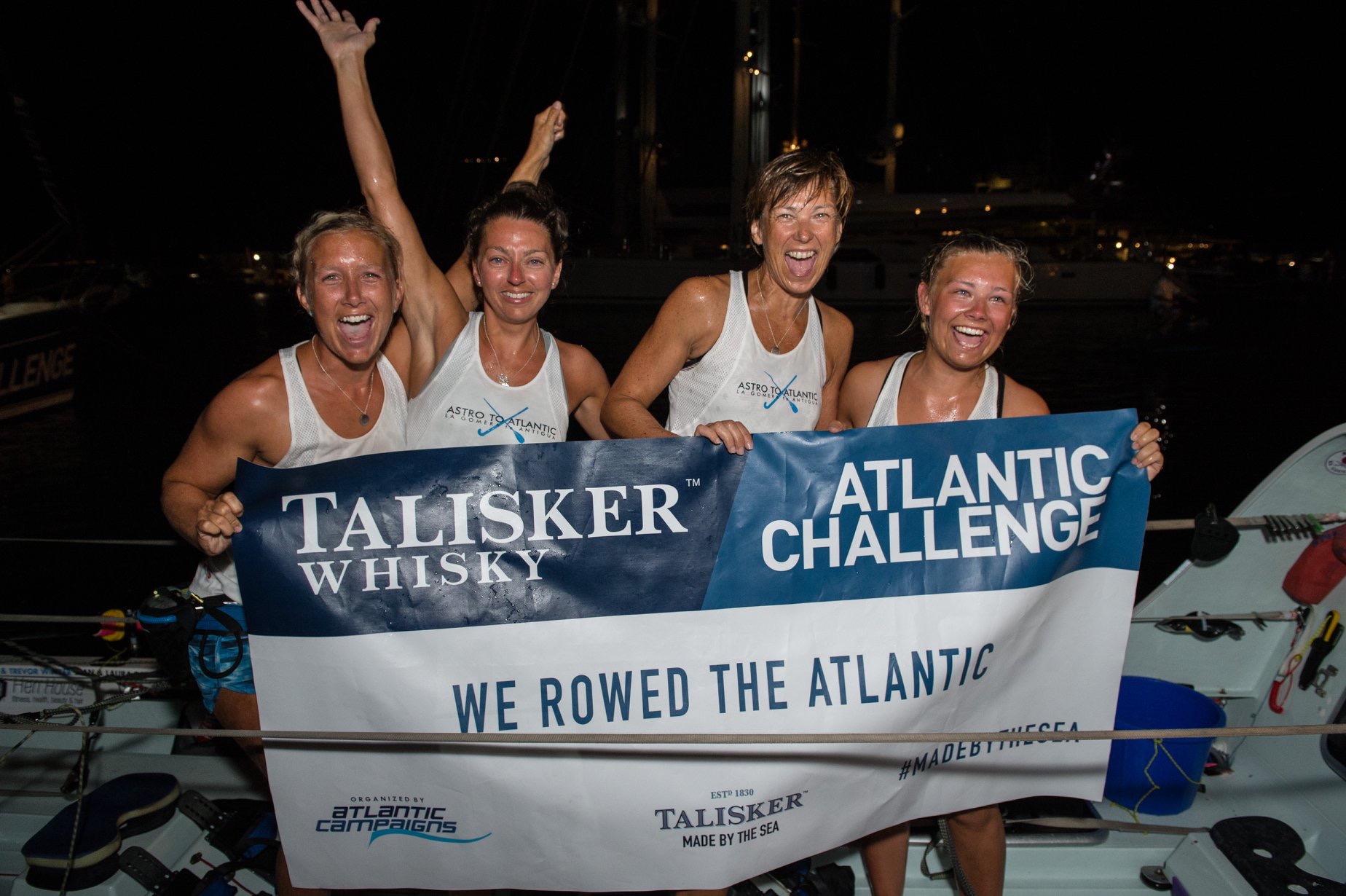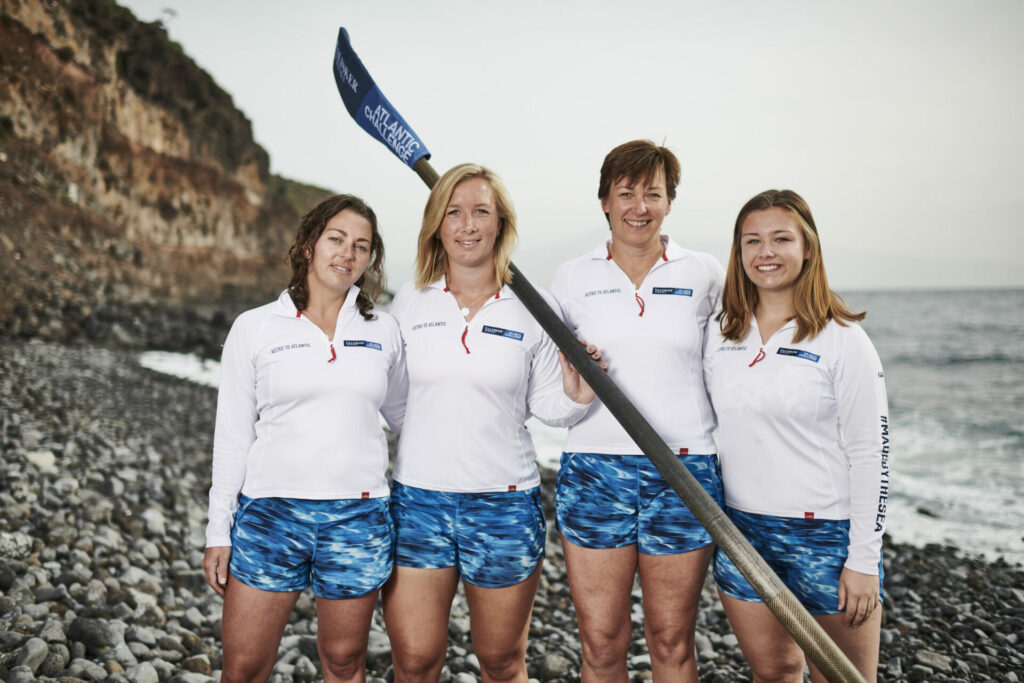
From the moment they came up with a plan to conquer the Atlantic, four players knew that teamwork would see them through. RORY WATSON reports
Two years ago last month, four members of the Salcombe and Kingsbridge Cougars, the smallest club in the Premier 2B ladies league, completed the gruelling Talisker Atlantic Challenge row known as “The World’s Toughest Row” to raise funds for the Devon Air Ambulance Trust.
Helen Symons (half, 33), Louise Read (sweeper, 50), Chloe Harvey (forward, 27) and Emily Read (defender, 21) swapped their hockey sticks for oars and spent 45 days at sea battling the elements before arriving on the Caribbean island of Antigua. With adversity hitting them before departure in the form of cruel injury to one of the team, they demonstrated a composure borne of 13 years playing together, and turned to another of their teammates, who happened to be the daughter of one of their crew.
Harvey, former club captain and current Cougars striker, explained how mother and daughter became an integral part of their foursome, and highlights how important so many years of playing together was in inspiring them to complete this utterly daunting event.
“Helen and Lou had come up with the idea for this challenge while cycling together from John o’ Groats to Lands’ End a few years back,” explains Harvey. “It was always going to be teammates that they looked to. This was the obvious choice for them as they know all our different abilities and what drives us. I was the first person they asked in March, two years before the event [to join them in a four], and I just couldn’t say no to my teammates – that was the bottom line.”

“Gemma, who was part of our original crew tore her anterior cruciate ligament while playing hockey in October, 14 months before the actual row,” sympathises Chloe. “She actually paid for a private operation in the hope that she could still take part, but by January she realised she was just not going to be able to complete the training. That’s when Emily came in. She was the daughter of Lou, our youngest hockey teammate, and became youngest crew member!
“People played exactly the roles that we expected from being in a hockey team together for so long,” adds Chloe.
“We played to our respective strengths, as we know what we were all capable of so would get the right person to do what they were best at. Lou was ‘mother hen’ getting us all organised and making sure we hit deadlines. She also looked out for people on the boat though she lost three stone on the row as she was the one really hit by seasickness. Helen was our skipper and tactician defining our goals for each day – she does exactly the same for our hockey team.”
Harvey was dubbed the ‘Strength on the Oars’. After all, she had a serious Cross Fit background as well as her hockey. Meanwhile, Read, the youngest oar, had a deep understanding of the Ocean. She was also the practical one. If you needed a knot tying, says Harvey, you went to Emily. “She has a very practical and calm approach on the hockey pitch and that seemed to transfer itself to the row.”
The initial reaction of the Cougar side was mixed – they were not happy to be losing four teammates for half of the hockey season. But they realised that when compared with a lifetime achievement, this was a small price for them to pay.
“A lot of the teammates went above and beyond what one might have reasonably expected – waitressing at fundraiser balls, doing extra gym sessions with us to keep us company – they really got on board.”
With a view to breaking the world record for a female crew, the team embarked on a relentless training over 18 months, ultimately turning these hockey players into endurance athletes. Listening to Chloe’s engrossing tale, it is clear how profoundly their experience as long term teammates affected and inspired them in completing the mission as one of a handful of all girls crews, though weather cruelly ended their chances of any record.
“The majority of the time we rowed in pairs, starting as planned – two hours on, two hours off – in your break you’d have to either eat, or undertake boat maintenance and checks, wash, sort your sores out and rest for whatever time you could. The trade winds never really developed during our trip so we ended up doing three hours on, one hour off, so our sleeps seemed pretty quick. We had a lot of hallucinations – Lou was the funniest, passing us imaginary glasses of wine and waving at her brother. Emily would also be hilarious; at night she would wander round the boat like a zombie doing her own ‘clip show’, clipping her harness into the speaker, the seat, or anything she could find …”
One can only admire the natural team spirit that was so obviously ingrained in these long term teammates, as well as the understated way Chloe describes their various ordeals. “We found it easier if you made food for your partner, helped each other with washing, and stuff like that to try and save time.”
Humour clearly played a big part in keeping up spirits. “Having bets on who would be hit that night by a flying fish was always amusing. If you get hit by one, you definitely know about it. Whoever was closest had to then get it out of the boat, and there would always be a lot of screaming and laughing!”

Harvey has no doubt their shared experiences from the hockey pitch mattered. “It was really apparent at the start line in the Canaries that we had functioned together for so long as hockey teammates, and a lot of the other crews commented and complimented us on it, and our team spirit. We knew what each other needed just from body language and there’s no doubt this made a big difference.”
The team’s effort to break the all-female world record was hampered by the lack of anticipated trade winds, that normally power boats on. While this resulted in safer conditions, the weather presented its own challenges.
“The hardest times were when we were rowing for three days into head winds and not really going anywhere. A lot of other teams put out their power anchors which keeps you pretty stationary and allows you to rest, but we were too stubborn and determined to get a good time, so just kept going.”
And despite the team’s low key manner, it is clear that the quartet had plenty to contend with.
“The scariest point was with a couple of days to go when our autopilot detached from the rudder at night in waves and rain and the boat span around and started heading in the wrong direction. We couldn’t turn the boat around because of the waves so we all had to get out on the oars to try and turn the boat around with one of us on the rudder. I remember thinking as the waves crashed over us this could be horrendous. We got the autopilot working again, only for it to fail two hours later. That was a rough night for all of us.”
It is heart-warming to realise how much the hockey team is a part of the girls’ lives, and also how much support the team were given by the local Devon community.
“Exeter Chiefs rugby club got involved because Lou’s other daughter Abbey goes out with Stuart Townsend, one of their players… one of our big money spinners was the ‘Compete With The Stars’ 200 metre rowing challenge,” says Harvey.
“We got several of the Exeter Chiefs players along with Giselle Ansley to do sprints on an indoor rowing machine – then we took a machine along to each fundraising event and the public tried to beat their times. Giselle was born in Kingsbridge, and was a supporter of ours from the start. We are all Kingsbridge-born Devon girls, and we discovered that was worth as much as big corporate sponsorship. We’re just “Small Town Girls’! In the end we raised nearly all of our money off local businesses in Devon. We were really lucky.
“We’re a small club compared to a lot of the other teams we meet on the pitch, but we get recognised now, and congratulated by opposition which is really nice. In the end the Devon Umpires Association sponsored us as well, though we definitely haven’t noticed them giving us any favouritism with their decisions!”
By the end of our interview, it is clear that Chloe is itching for another adventure, and no surprise as to who she will call upon. “At least three of our team said that we wouldn’t rule out another Ocean row, but there has also been talk of desert or snow. I think there’ll be something, and a few of our teammates have already expressed an interest in joining us.”
There appears to be no limit as to what might happen with dreams that started on a hockey pitch. Clearly this was the experience of a lifetime for these four ‘Small Town Girl’ players.
A day at sea…
Day 29. Today is another tough day. The sea state is calmer than expected, we have a headwind against us trying to force us backwards – our boat feels crazily heavy. We are frustrated by the lack of favourable winds, however are advised they are due to change at the end of the week. We can get through this. We have seen another whale again today, a Minke whale about the size of our boat but it is very peaceful and inquisitive next to our oars – these are always such special moments. Last night on shift Helen and I dealt with numerous flying fish, hitting us in the face and shoulders but they were all returned to sea safely! Looking forward to the sunrise.”
The aftermath…
On their return to the west country, the team slowly built back their physical strength to be picked for hockey. Each member lost over 10kgs during the crossing – mainly muscle mass which saw their beloved hockey thighs rapidly shrink over the 45 days. Harvey admitted it was a tough recovery back to match fitness. “But this was a relatively small price to pay for the lifetime experience gained of rowing an ocean,” she says.
The girls now hope to inspire more women and the younger generation to step outside their comfort zones and try something new. It’s about having the confidence to take that first step, says Harvey. The team’s love for hockey was how they all met. However their thirst for adventure was where they thrived.
This article is an updated archive story from our print edition in 2019

